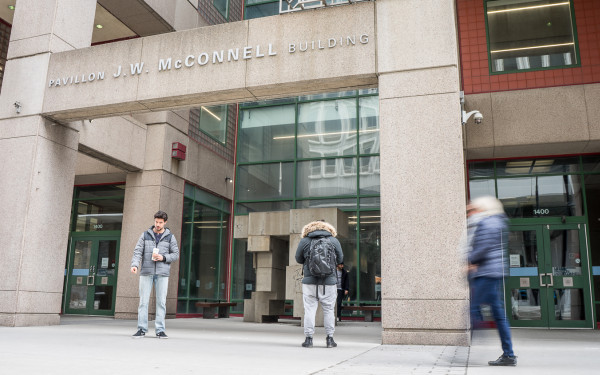Frigo Vert Still Not Wheelchair Accessible
No Progress Made Since the Co-op’s Move in 2016
Frigo Vert, the co-op health-food store on the Concordia University downtown campus, is still not fully wheelchair accessible.
No changes have been made since its official opening in September.
Namely, there’s still no railing for the wheelchair ramp outside the store.
In 2016, the co-op moved from its former location on Mackay St. to a space across the street from the Webster library. At the time, Maria Forti, a collective member, said that one of the main reasons for the relocation was to increase accessibility to all students.
Another collective member, Hunter Cubitt-Cooke, recently explained that the building Frigo Vert moved into has been sold and that the “new landlords have said they will repair it after construction” of the building is completed.
In September, the path from the outdoor ramp to the store’s doors was blocked by a ladder used by the construction workers. Cubitt-Cooke added that the ramp is now in disrepair due to the construction.
The collective’s website promises that once the ramp is repaired, they will be painting it and adding signs, pointing it out.
Frigo Vert is currently in negotiation with the landlords in regards to their “specific need and designs.” The relationship between the health store and the new landlord has so far been good, said Cubitt-Cooke.
In an email, however, Marie Christine Hebert, the building’s property manager, said they will not be helping with their renovations.
When it moved, Frigo Vert received $130,000 in financial aid, $100,000 of which came from the Concordia Student Union’s Student Space, Accessible Education and Legal Contingency fund.
In addition to the ramp, Frigo Vert would also like to install automatic doors. At the 2016 Radical Accessibility Audit-a-Thon, organized by the Community-University Research Exchange, a non fee-levy group at Concordia, the lack of automatic doors around campus was identified as a problem by some students.
Frigo Vert’s Accessibility Info Summary, an audit available on their website, explains that they’ve applied for a grant to fund the purchasing and installation of new doors.
Frigo Vert is still looking to apply for other grants such as the Programme d’immobilisation en entrepreneuriat collectif intended for businesses that are part of the Quebec social economy. Cubitt-Cooke said, however, that Frigo Vert first wants to get its finances in order before moving forward.
“We are currently working on our budget in order to figure out where we can afford to spend our resources and what our priorities are as far as new projects are concerned.”
Cubitt-Cooke also explained that the energy costs have gone down as the new space is more efficient. Plus, sales are up. Frigo Vert hasn’t been in the space long enough to do an annual evaluation.
When it moved, Frigo Vert received $130,000 in financial aid, $100,000 of which came from the Concordia Student Union’s Student Space, Accessible Education and Legal Contingency fund.
However, the CSU does not oversee Frigo Vert’s finances because it is an independent fee-levy organization “with no permanent dependence on the union,” said CSU Finance Coordinator Thomas David-Bashore.
The $100,000 grant, according to David-Bashore, “was given based on the CSU’s commitment to an accessible campus” and because of “Frigo Vert’s demonstrated financial responsibility and long history of contribution to student well-being.”
The collective also wants to create new coordinator roles and change “the structure and organization of the workloads.” Cubitt-Cooke said that Frigo Vert is always seeking to improve its organization.
“One of our goals is to better distribute the labor and another is to prevent tasks from falling through the cracks.”

_700_1050_90.jpg)

_600_375_90_s_c1.jpg)

3_600_375_90_s_c1.jpg)
_600_375_90_s_c1.jpg)